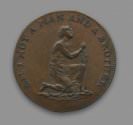[Untitled map of abolition of the slave trade] from The History of the Rise, Progress, and Accomplishment of the Abolition of the African Slave-Trade by the British Parliament

T. Clarkson, [Untitled map of abolition of the slave trade][Untitled map of abolition of the slave trade] from Thomas Clarkson, The History of the Rise, Progress, and Accomplishment of the Abolition of the African Slave-Trade by the British Parliament. Beinecke Rare Book and Manuscript Library, In W890 Zz808
[Untitled map of abolition of the slave trade] from The History of the Rise, Progress, and Accomplishment of the Abolition of the African Slave-Trade by the British Parliament
1808
Thomas Clarkson
1760-1846
Thomas Clarkson’s triumphant History appeared one year after the British Parliament passed “An Act for the Abolition of the Slave Trade.” The act abolished the slave trade—but not the institution of slavery—throughout the British Empire. (Slavery was abolished much later, by an Act of 1833.)
Clarkson was one of Britain’s leading abolitionists. In his account, he identifies Sir Joshua Reynolds as an early and important supporter of the antislave-trade campaign. In May 1787, Reynolds attended a dinner, hosted on Clarkson’s behalf, which was intended to encourage the politician William Wilberforce to “take up the question [of the slave trade] in Parliament.” In the course of the evening, Clarkson recounts, Reynolds “gave his unqualified approbation of the abolition of this cruel traffic.” Wilberforce assented to his hosts’ request. Within weeks, the Society for Effecting the Abolition of the Slave Trade was founded with Clarkson at its helm.
Autographed presentation copy to Mrs. Elizabeth Cookson from S. T. Coleridge. On fly-leaf at front of v.1 is Mrs. Wordsworth’s manuscript copy of her husband’s sonnet, “To Thos. Clarkson, on the final passing of the bill for the abolition of the slave trade. March 1807,” dated 1846 and signed by Wordsworth.
Beinecke Rare Book and Manuscript Library, Yale University, In W890 Zz808

![[Unknown artist], *Signet ring for wax seal*. Yale Center for British Art [Unknown artist], Signet ring for wax seal](https://interactive.britishart.yale.edu/sites/default/files/styles/ycba_thumbnail/public/FoE_UnknownConder_signet%20ring%20for%20wax%20seal.jpg?itok=ZBYygltm)
